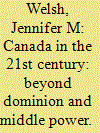| Srl | Item |
| 1 |
ID:
054470


|
|
|
| 2 |
ID:
164460


|
|
|
|
|
| Summary/Abstract |
This article begins by critically assessing some of the current measures used to evaluate the status and impact of the Responsibility to Protect (RtoP). It then lays the groundwork for a deeper examination of RtoP's strength by specifying what kind of norm it is, and what it can reasonably be expected to do. The third section engages Zimmerman and Deitelhoff's framework on norm robustness and contestation by positing two arguments. First, the past decade of diplomatic engagement and policy development has brought about greater consensus on RtoP's core elements, and thus enhanced its validity; however, this process has also dampened many of RtoP's original cosmopolitan aspirations. Second, persistent applicatory contestation about RtoP's so-called third pillar is revealing deeper concerns about the norm's justification – thereby leading some actors to avoid framing situations with RtoP terminology. I use two cases to address the broader theoretical questions raised about whether and how language matters in assessing norm robustness: the international community's response to the deepening political violence in Burundi in 2015, and the evolution of the international community's response to the war in Syria (2011–17). While these cases illustrate changing perceptions of the political utility of RtoP language, concrete engagement by the international community, particularly in the Burundi case, indicates that RtoP's validity remains intact. The article concludes that norm decay is not equivalent to norm death, and that RtoP's prescriptions will survive given that they are embedded in a broader normative structure of human rights, humanitarian law, and civilian protection.
|
|
|
|
|
|
|
|
|
|
|
|
|
|
|
|
| 3 |
ID:
107565


|
|
|
|
|
| Publication |
2011.
|
| Summary/Abstract |
While R. J. Vincent's overall goal in Human rights and International Relations was to demonstrate how human rights might be promoted in international society, there was one area in which he was sceptical about allowing human rights to serve as the basis for international conduct: military intervention. This article begins by demonstrating that Vincent's greatest fear-that legitimizing humanitarian intervention would lead to countless wars-has proved largely unfounded. Nonintervention in the face of gross violations of human rights has marked the post-Cold War period more than rampant interventionism. Moreover, while the use of force for humanitarian purposes has become acceptable in very exceptional circumstances, the manner in which it has been legitimized and the depth of the consensus around its appropriateness illustrate lingering scepticism among states about infringements of sovereignty. The article concludes by showing how Vincent's writings on humanitarian intervention, in particular his caution about an imperialist advance of cosmopolitanism, might provide a basis for a more robust normative defence of pluralism in contemporary international society.
|
|
|
|
|
|
|
|
|
|
|
|
|
|
|
|
| 4 |
ID:
147558


|
|
|
|
|
| Summary/Abstract |
Despite the commitment made by all heads of state attending the 2005 World Summit to uphold the principle of the responsibility to protect (R2P), atrocity crimes continue to be committed by states and nonstate actors. This essay argues that assessments of R2P's effectiveness too often overlook the political nature of the principle – with the strengths and weaknesses that this status entails – and apply rigid standards of success that both underestimate its contribution to building capacity to prevent and respond to atrocity crimes and overemphasize the role of military intervention. It also suggests that R2P is best understood as a “duty of conduct” to identify when atrocity crimes are being committed and to deliberate on the best form of collective response. The cases of Libya and Syria have nonetheless raised fundamental questions about the prospect of catalyzing international efforts to protect populations, particularly when there is disagreement over the costs and benefits of a coercive response.
|
|
|
|
|
|
|
|
|
|
|
|
|
|
|
|
| 5 |
ID:
146673


|
|
|
|
|
| Summary/Abstract |
Far from having faded away, ten years after its formal adoption, the responsibility to protect (R2P), is arguably more relevant than ever. In the current overall context of protection crises, heightened in severity by the emergence of violent extremists, R2P has changed the way in which the international community characterises situations that involve protection failures, and has raised expectations about what should occur when atrocity crimes have been committed or are imminent. UN member states now agree that prevention is at the core of R2P, that international action should employ the full range of diplomatic, political and humanitarian measures, and that military force should only be considered as a measure of last resort. While there is continued contestation about particular aspects of R2P – as there is over much older normative advancements, such as human rights – R2P has helped to forge political consensus and build new institutional capacity to prevent and respond to atrocity crimes.
|
|
|
|
|
|
|
|
|
|
|
|
|
|
|
|